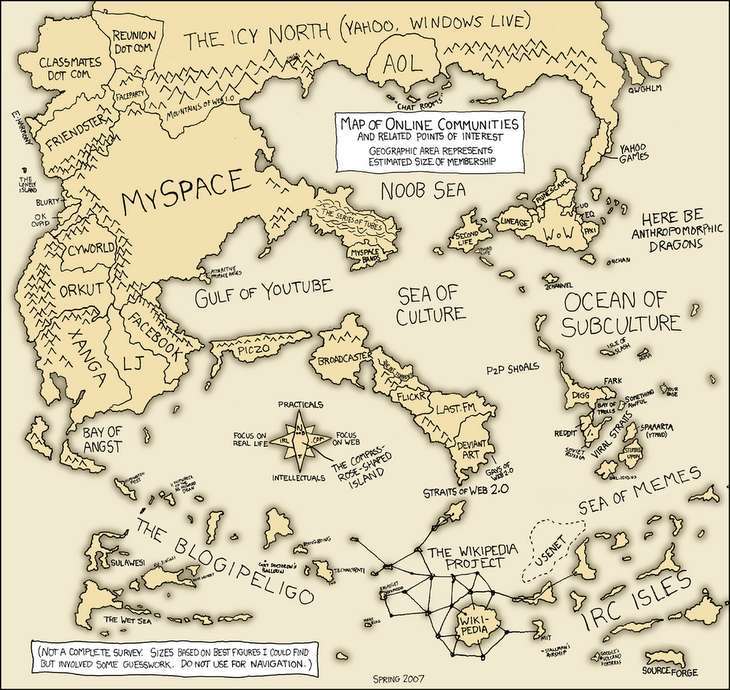Chapter 1: The Shifting Politics of the Computational Metaphor
-Sacio and the Free Speech Movement of the 60s opposed the mechanization of society through the guise of the university, the military, and information technologies.
-30 years later, what was once a threat was now a promise of liberation, expressed through the evolving personalization of the Internet.
-Barlow's Declaration of the Independence of Cyberspace in proclamation of the liberating nature of the Internet for overthrowing the bureaucracy. Social revolution?
-Esther Dyson believed that the Internet would become a digital marketplace that would allow consumers and corporations to negotiate equally, thus dissolving the tyranny of corporate hierarchies (Release 2.0: A Design for Living in the Digital Age).
-Kevin Kelly believed we were moving toward a "computational metaphor" in human understanding, in which the universe is a computer according to a new vocabulary that is now emerging.
-Disembodiment: dehumanization or equality?
The Forgotten Openness of the Closed World
-Post WWII era was dominated by a "closed world discourse", in which both the individual mind and the military were viewed as mechanized tools of control- cognitive psychology began utilizing the computational metaphor to describe the human brain, and in the military plans and operations were visually rendered through computer programming.
-Though this mechanization of society is exactly what students of the 60's rebelled against, at the time this discourse allowed for a quite flexible and creative style of research. This led to the rise of the military industrial complex and interdisciplinary collaboration.
-In the pursuit of military technology, scientists and researchers from many disciplines devised a new language with which to communicate.
-Humans and machines in collaboration within a larger, fluid socio-technical system- a "feedback system" that was then extended to human biology and society.
-This led to the deveopment of cybernetics (Norbert Wiener)- "the study of messages as a means of controlling machinery and society".
-In this frame, the media is viewed as a "servomechanism" that maintains the homeostasis of society through a feedback system of messages.
-Though computers threatened automation of people and society, they also brought hope for the possibility of a more democratic creation of order.
The Countercultural Embrace of Technology and Consciousness
-In the eyes of the left, the computational metaphor was one designed to create and maintain an unfeeling "technocracy" (Roszak).
-Lewis Mumford's The Myth of the Machine envisioned a world in which the technocratic elite are bent on designing man as an automaton whose proper functions will be controlled by the machine.
-In the postwar period, thanks in large part to research grants funded by the military, university enrollment exploded.
-Two forms of counterculture emerged in the 1960's: the New Left, which struggled for civil rights, free speech and voter registration (outward political action); and cold war-era culture marked by Zen Buddhism, Beat writings, action painting, and psychedelic drugs (inward consciousness and communalism).
-The New Communalists, contrary to the New Left, embraced the communal and egalitarian potential of cybernetics.
The New Left worked within the political structure in order to achieve their goals of establishing a true community and ending alienation. The New Communalists, however, believed political activism to be beside the point- that true community existed outside of traditional notions of chains of command. True community was to be found when transcendence from "the myth of objective consciousness" was achieved, and individual selves transformed.
-Charles Reich's The Greening of America detailed 3 historical stages of socioeconomic consciousness:
1. agriculture: farmers and small businessmen
2. industrial bureaucracies: society organized through complex organizations and new technologies of control and communication.
3. beaureaucratically levelled communities: harmonious collaborations working to end technocratic institutions.
-In this vein, if the mind is to be the source of change, then the sharing of information is a crucial step in that process- an "ebb and flow of communication".
---
This well explains the history of perceptions regarding information technologies. With this history in mind, it would be interesting to gauge the current perception of the Internet as it becomes increasingly a site for both interactivity/communication/community-building and corporate schemas, economically entrenched but intellectually dispersed.
On one end we have open source collaboration, but on the other we have the rise of a hegemonic Google institution. Somewhere in the middle lie social networking services such as Facebook and Myspace. In the ephemeral space of the Internet, however, time and power work together to allow for immediate collective awareness and consequent action. The trick is in the hook- for instance, Facebook alienated its users with the implementation of the News Feed, to the extent that its users collectively organized in protest. However, this collective organization would not have been possible WITHOUT Facebook, and in this way they are institutionalized. This happens when certain Internet systems become integrated in the daily functioning of individuals in society. To disengage from these systems would be to disengage with a symbolic structure of one's membership in her community.
If we are to examine Internet culture through the lens of Reich, it would seem we exist still in the second level of consciousness. If a counterculture exists on the Internet, it could do so in two ways: by utilizing the existing social institutions of the Internet to spread awareness and make political statements, or to abandon the existing institutions altogether in favor of a back-to-cyberspace approach of creating communal sites in which individuals work to raise their own consciousnesses and fulfill their human potentials.
April 26, 2007
Lit Review: From Counterculture to Cyberculture (Fred Turner)
Labels:
communication,
discourse,
embodiment,
future,
internet culture,
politics
Subscribe to:
Post Comments (Atom)





1 comment:
thanks a lot for this summary - it's really helpful!
Kx
Post a Comment